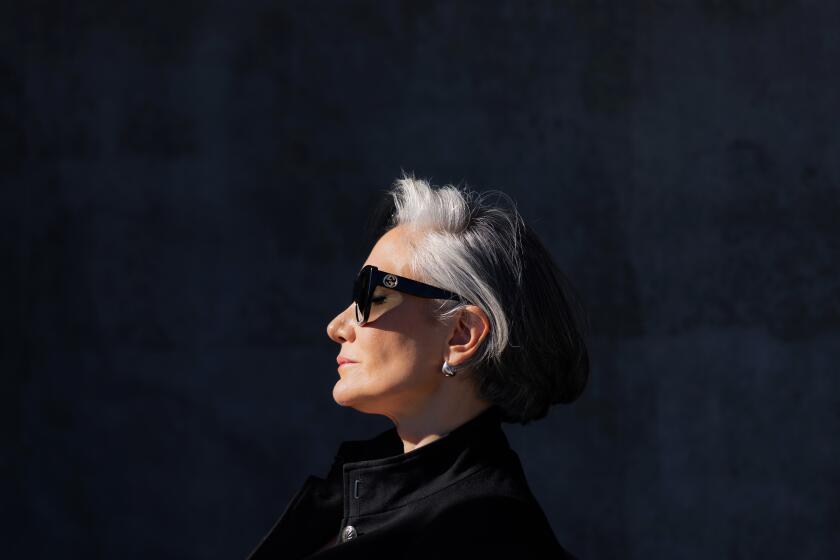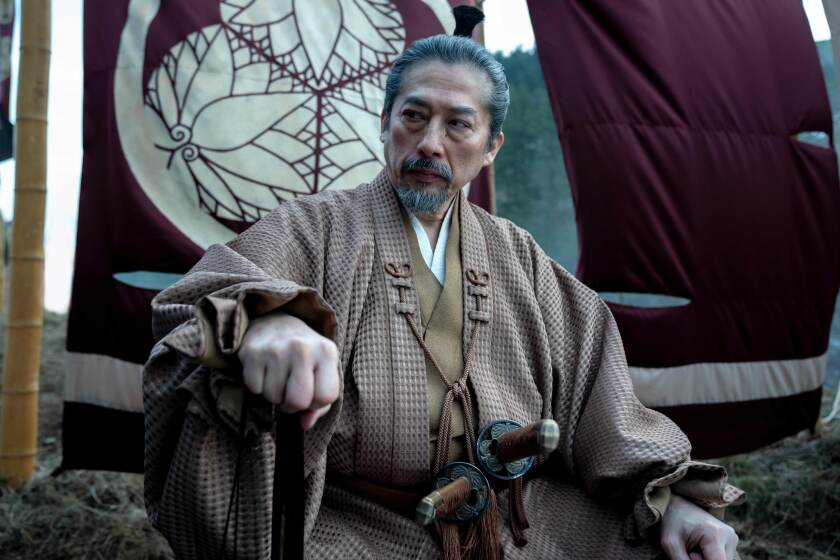
- Share via
Kali Reis hits hard. That’s true whether she’s co-starring opposite Jodie Foster in the fourth season of HBO’s “True Detective” as a troubled state trooper investigating a mysterious mass murder just as Alaska has entered its darkest time of the year, or as a pro boxer with 19 wins and two weight-class world championships to her credit. She also contains multitudes, with Cape Verdean ancestry and as a member of the Seaconke Wampanoag tribe whose husband is Jewish and Sicilian. (During holidays, she quips, “We have seven fishes, the dreidels and lots of candles.”)
Reis got on Zoom with The Envelope to talk about light in the darkness, Indigenous stories and taking on the bullies of the world.
As a Rhode Island native you know about New England winters, but were you prepared for the bitterness of Iceland and Alaska, where “True Detective: Night Country” was filmed?
I know what it’s like to go through brutal cold. So that helped me prepare, but it was still freezing. Iceland hits different with the wind. I love heated socks now. We are set in Alaska, and I absolutely look up to and love the Indigenous people who’ve lived there for centuries. They’re real badasses, the way they survive.
The new season of HBO’s ‘True Detective’ is Issa López’s biggest project to date, and it’s deeply personal for the Mexican filmmaker, who says it’s rooted in the trauma she experienced following her mother’s death.
How much of the appeal of your role as Evangeline Navarro was the ability to lean into playing an Indigenous character?
I’m not Iñupiat, so this was a chance for me to go outside my own community. This was a chance for me to learn. I don’t speak for all Indigenous people — especially being somebody of mixed race. But it was an opportunity to do it the right way.
What’s bothered you in the past about other portrayals of Indigenous culture and life that you’ve seen?
The whole cowboys and Indians, the savages — it’s beyond the film industry. The portrayals piss me off — the one-dimensional look where a Native person is always the same — drug addict, alcoholic, beat-up woman. We are funny, have everyday lives, we’re trying to fight for our culture, our lands, our people — and still live in 2024. We’re not in the 1500s or 1600s, we’re here, and we still go through generational trauma. Native people are hilarious. We love to tell stories. We don’t shut up. We’re long-winded. That’s the type of things I want to see now.
And how do you feel this season’s showrunner, Issa López, handled all that?
She did a really good job, including seeing what’s practical and that there’s a reason for how we think and what we believe. I always say, “The land does not belong to us, we belong to it, and the people of those Indigenous lands know what it needs.”

You’re reasonably new to acting, so what did you learn from working with veteran Jodie Foster?
I hadn’t even realized that a lot of my top movies featured her. The closer it came to me going to Iceland, the more nervous I got. But it was amazing working with her. I learned a lot. She’s hilarious. You’ll hear her say, “This is really Navarro’s story. I want to support that.”
What did you pick up from watching her?
Don’t take things so seriously. She takes her work very serious, she’s very serious about her prep. But once you get there, and I know this from boxing, it’s like, “Let’s see what we can do.” I’m a Virgo and I try to make everything so competitive. But with her I [learned to be] like, “Yo, just chill, man.”
You’ve been a star in the boxing ring. Why give acting a try?
I’ve always been interested in performing creatively. I would ransack my mom’s closet and come up with these characters. I needed a break from boxing for health reasons. When I was around 22, I went through menopause, and then 10 years later things woke back up again, so I was dealing with the aftermath of that. The entire year of 2021, when I was training for those last two fights, I was losing too much weight too fast, things were not [the right] hormone levels. My body was like, “Have a seat.” Things have ironed out now.
Our BuzzMeter panel of veteran TV journalists and pundits offers their take on what will take the awards at the 2024 Emmys on Sept. 15.
So you’re not retired from boxing?
You don’t know how to retire. I haven’t officially hung [my gloves] up. Acting has taken the front seat, and it’s something that has more longevity than combat sports. There are one or two fights I’d come up out of my chair for.
I got punched in the face once as a kid and that was one time more than I ever wanted. So why did you go into a sport where you get punched a lot?
I used to fight in the street as a kid. I’d try to fight the bully who was bullying kids. I didn’t like that. Getting punched is as dumb as it sounds — but it doesn’t hurt. It’s more like the art of it. It’s like thinking on your toes. It’s not fun to get punched in the face — but it’s a lot of fun to be able to dance and create that whole story.
More to Read
From the Oscars to the Emmys.
Get the Envelope newsletter for exclusive awards season coverage, behind-the-scenes stories from the Envelope podcast and columnist Glenn Whipp’s must-read analysis.
You may occasionally receive promotional content from the Los Angeles Times.








